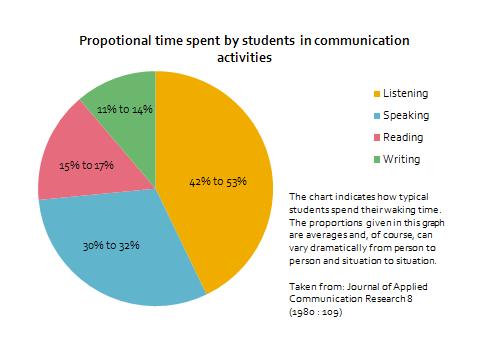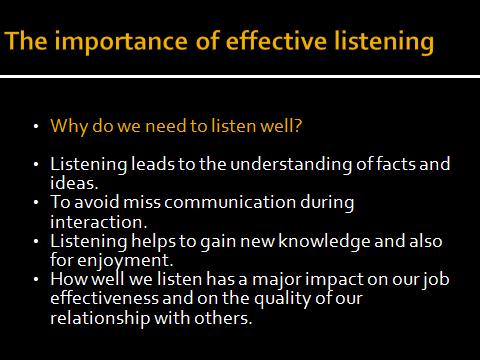Listening
LISTENING
What is listening? Why is it important for us to learn listening skill? In this lesson, we will know how effective listening can bring benefit to our life and what are the steps to become effective listeners.
Most misunderstandings that arise in our daily lives occur because of poor listening habits. Poor listening skills can create serious personal, professional and financial problems. For students, poor listening can result in incorrect assignments, missed appointments, misunderstood directions, lower grades and lost job opportunities. Therefore, listening is a skill that one needs to be competent in. To enhance your listening competence you will need to understand the importance of effective listening, the stages of effective listening , the functions of listening, the most common barriers to listening, how to analyze and evaluate what you listen to and specific steps to improve your listening.
Whether you realize or not, you have spent listening almost every time of your waking day. If you are not talking or reading, you are probably listening to something or someone. Communication scholar Larry Barker and several collegues found that students spend nearly half of their time listening, almost one-third of it speaking and less than one- third of it reading and writing ( see figure 1.0).
THE IMPORTANCE OF EFFECTIVE LISTENING
THE STAGES OF EFFECTIVE LISTENING
Listening and hearing : Is there a difference ?
Listening scholars and teachers do agree that hearing and listening are not the same. It is impossible to listen to sounds without first hearing them, but it is possible to hear sounds without listening to them. What distinguishes listening from hearing? Most scholars agree that the major difference between listening and hearing is expressed by the word active. Listening is the active process of receiving aural stimuli by hearing, selecting, attending, understanding, evaluating and remembering whereas hearing is a passive physiological process in which sound is received by the ear. Listening requires energy and desire. you must get involved and work at listening. Listening doesn’t just happen; we must make it happen. Hearing, however occurs with little or no effort when sound waves reach our ears. Thus, a person can have excellent hearing ( the physical ability to hear sounds) but be a terrible listener. The International Listening Association (ILA) elaborates on the definition of listening: ” the process of receiving, constructing meaning from and responding to spoken or nonverbal messages”. This definition takes into account some of the six stages of listening discussed in the next section and also focuses on what you do with the information you gain when you listen to others.
 Figure 1.1 : The stages of effective listening
Figure 1.1 : The stages of effective listening
The listening process involve six stages: hearing, selecting, attending, understanding, evaluating and remembering. Connected to these six stages is the final aspect of responding (see figure 1.1).
Hearing
Hearing is the passive registering of sounds; the ILA definition of listening identifies the first part of the listening process as receiving, which happens when you hear. You may sense the sounds, but you do not allow them to penetrate beyond a superficial level. For example, when you lay the radio while studying, you hear the music , but are you really listening to it? The radio provides background sounds that become listening only when you also carry out the remaining stages of the listening process.
Selecting
To make sense out of our environment, we must choose which stimuli we will listen to and which we will ignore. This process is called selecting. For example, at a party a friend maybe talking to you while loud music is playing and other people are talking. In order to listen to the friend speak, you would select the friend’s voice and ignore the other sounds and stimuli.
Attending
Not only must you select what you are going to listen to , but you must also attend to it. Attending is a mental process of focussing or concentrating for a period of time of a specific stimuli that you have selected while ignoring or downplaying other competing, internal and external stimuli. Your attention span normally ranges from a few seconds to a much longer time period. The more things you notice around you, the less able you will be to concentrate on one single thing and listen to it effectively. Thus, it is important that you attend to the secific stimuli (message, sound) to which you want to listen. Attending to something does take effort and concentration, but this alone does not constitute listening.
Understanding
The main difference between hearing and listening is understanding. Once you have heard, selected and attended to sounds, you assign meaning to them. Although there is no commonly accepted explanation of how understanding occurs, it is known that past experiences play an important role and that you relate and compare new sounds to those you have heard in the past. The past knowledge that you have will help to increase your listening effectiveness.
Evaluating
In the evaluating stage, the listener analyzes evidence, sorts fact from opinion, determines the intent of the speaker, judges the accuracy of personal conclusions. Once we begin to assess the message we received and understood, we may no longer hear and attend to other incoming messages.
Remembering
When we say we are listening to someone, we may actually mean that we are paying attention to what is being said, we may not be indicating taht we understand the message or that we will remember it. Remembering is thinking of something again. The last aspect in the complete listening process is being able to recall what was said from stored memory. Unfortunately, many of us do not remember information for long. Why we remember some things and not others is not completely clear. Research beginning in 1931 and since corroborated by the ILA, suggests that we remember approximately half of the newly heard, meaningful information immediately after we hear it, but after a month we forget more than half of what we innitially remembered. Just as our understanding depends on the selecting and attending stages, so to does our memory. Researchers have found thaT 25% of what most people listen to can be recalled. Of that 25%, 80% is distorted or not received accurately; this leaves only 5% of the total message accurately received. The process of perception, especially selective perception and selective attention, may account for lost of information. We tend to select, attend to, and therefore, remember only information that supports our view. Other information is forgotten.
Responding: Sending Feedback
Responding is the listener’s overt behavior that indicates to the speaker what has and has not been received. Examples of such behaviors are total silence (didn’t hear the message, ignore the message or was angry about what the message said), smiling or frowning (agreeing or disagreeing with the message) and asking for clarification of what was received.
Giving feedback is an important art of being an effective listener. Feedback was defined as the response to a message that a receiver sends back to a source. Feedback helps ensure understanding and also helps speakers determine whether they have been successful in communication.
THE FUNCTIONS OF LISTENING
 Throughout this day you have listened to many different people and things for a variety of purposes. You listened to the alarm clock to get up at the right time; you listened to your friends’ opinions to evaluate the proposed removal of the oldest building on campus; you listened to your professor to get information about a subject; you listened to the concert for enjoyment; you listened to your troubled friend to understand his feelings. In each case, listening served a different function and involved different skills. Let’s look at each functions in greater detail and the listening skills that each requires.
Throughout this day you have listened to many different people and things for a variety of purposes. You listened to the alarm clock to get up at the right time; you listened to your friends’ opinions to evaluate the proposed removal of the oldest building on campus; you listened to your professor to get information about a subject; you listened to the concert for enjoyment; you listened to your troubled friend to understand his feelings. In each case, listening served a different function and involved different skills. Let’s look at each functions in greater detail and the listening skills that each requires.
Listening to obtain information
You probably send most of your listening time listening for information, that is, listening to gain comprehension. You listen as your teacher discusses process, perception, nonverbal and verbal communication, famous speakers and similar topics in order to learn about speech skills. Each day you listen for information such as news, weather forecasts, sorts scores, directions, orders, assigments, names, numbers and locations.
Listening to evaluate
Evaluative listening is listening to judge or to analyze information. For example, teacher listens to students’ speeches to discriminate between good and poor presentations and to assign grades. In most situation we all should listen critically. We should constantly judge evidence, arguments, facts and values. We need to ask questions if we hope to be effective listener. We are bombarded by messages asking us to believe, accept or buy things. For our own protection, we must evaluate everything to which we listen.
Listening with empathy
Emphatic listening occurs when you listen to what someone else is experiencing and seek to understand that person’s thoughts and feelings. It is not sympathy, which means that you feel sorry for the other person. Emphaty means you try to put yourself in another’s place to try to understand what is happening to him or her. Most of us find it difficult to avoid makings judgement when we listen to someone else’s problems, but that is exactly what we must do if we hope to listen with emphathy. Listening emphatically can be a healing and soothing process. Emphatic listening indicates that we are aware, appreciative and understanding of another person’s feeling.
BARRIERS TO EFFECTIVE LISTENING













